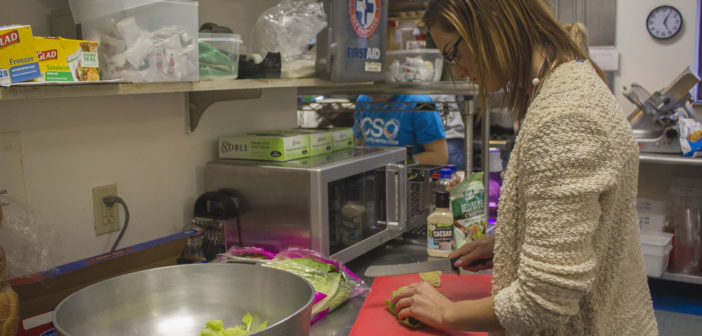Six years ago, Brian Smith, a then-homeless veteran, spent a year as a resident at Victory House of the Lehigh Valley. Today, he works there as a residential staff supervisor.
Smith is one of many men Victory House has helped since it was founded in 1985. Victory House is a nonprofit, all-male homeless shelter located on Fillmore Street that aims to get its residents out of addiction and into jobs, schools and ultimately residences of their own.
And for the past 20 years — since the Community Service Office’s inception — Lehigh has played a role in helping improve the lives of these men.
Once a week, Lehigh students spend two hours at Victory House cooking and serving dinner for the men who live there. Because of the size of Victory House’s small kitchen, only five to seven Lehigh students are allowed to volunteer each week.
Students provide the men with a home-cooked meal and also serve as outlets of support.
“It made me feel like somebody else cared, you know what I mean?” Smith said. “You don’t get a lot of support from a lot of schools and communities . . . and for Lehigh to come here and show the love and support over the many years that they have, is greatly appreciated.”
Victory House has a capacity of 40 men, so student volunteers must be prepared to cook large quantities for dinner when they volunteer. Because of budgetary reasons, students typically are not able to eat with the men they are serving. However, they still stay to sit and talk with the residents while they eat dinner, said Carolina Hernandez, the director of the Community Service Office.
Chris, who declined to give his last name, is a fairly new resident at Victory House. He said it’s “encouraging” to be able to get to know Lehigh students, and hopes that during his stay, he will be able to form relationships with frequent volunteers.
“It’s nice, you know, to show that they care because a lot of people here don’t have anything, and to see the young people having involvement and helping us gives us hope,” Chris said.
The Community Service Office makes an effort to always prepare a new meal for the Victory House residents, staying away from basic, easy-to-make meals like pasta because a different volunteer group cooks for them each night, Hernandez said. This week the students prepared sloppy Joes, french fries and Caesar salad, and they made breakfast for dinner the previous week.
Ceara Hogan, ’17, a student coordinator for the Community Service Office, said they keep a recipe book in the office to make sure they don’t repeat any meals unless it is necessary.
Lehigh’s involvement with Victory House isn’t limited to the Community Service Office’s weekly meal preparation.
Last fall, Phi Sigma Pi cooked and served a meal at Victory House for one of its eight leadership events of the semester, said Cole Geryak, ’19, the former leadership chair of Phi Sigma Pi. In the past, the fraternity members painted a mural in one of Victory House’s common rooms.
Geryak said it was one of the fraternity’s most heavily attended events, attracting almost 20 members, which is about double what their service events usually get.
He encourages students to get involved with Victory House and the South Bethlehem community as a whole.
“Sometimes it can be kind of daunting to go and serve somewhere outside of just at Lehigh — It’s not in the Lehigh bubble as people say,” Geryak said. “So, don’t be afraid to just go out and actually make the effort to reach out to them.”
The Community Service Office offers a preLUsion program called Volunteer Experience, in which participants take a trip to Victory House to help garden, Hernandez said. Additionally, Lehigh’s Food Recovery Network works with Sodexo to salvage leftover food from Lower Cort and Rathbone Hall and make sure some is donated to Victory House.
Preparing dinner and gardening are only two of the several volunteer opportunities available at Victory House. Smith said volunteers can donate items like clothes, personal hygiene items and cleaning supplies as well as host cookouts and take the residents places to do activities with them outside of Victory House.
Residents at Victory House stay for a range of time, but the average goal is for their stays to last between four and seven months, Smith said. Victory House not only serves as a temporary home for them but also helps its residents transition back into the community by helping them build skills that they lack because of previous years of addiction.
“Advocacy is very important when you come here, you got to get things in order,” Smith said. “We’re not holding their hands, we’re guiding them through.”
And Lehigh students can be one of the many guides that help these men through transition process.






Comment policy
Comments posted to The Brown and White website are reviewed by a moderator before being approved. Incendiary speech or harassing language, including comments targeted at individuals, may be deemed unacceptable and not published. Spam and other soliciting will also be declined.
The Brown and White also reserves the right to not publish entirely anonymous comments.